
Recent discoveries regarding the gut and its relationship with the brain have revolutionized the way we look at that organ. Previously thought exclusively as a digestive tube, we now know that the gut, and more specifically the huge colony of microbes who live in there, play an important role in the production of hormones and vitamins, our immune system and our inflammatory response. Treating the gut has shown to improve the outcome in treatment of depression, Parkinson’s disease, obesity, cancer, allergies, diabetes, and stroke/head injuries.
The role of the microbiome
The gut is home of a vast and diverse community of commensal bacteria called the microbiome. This microbial community has co-evolved with the human body and recents studies estimate the total number of bacteria cells as 3×1013.(which is more than the total amount of human cells), regrouped in tens of thousands of different species. The function of each of those families is not still not completely well understood, but now know that the microbiome is directly responsible to synthesize vitamin, removing pathogens, or influencing other organs and even the brain through hormonal reactions that will then be released in the blood stream to reach those organs. Conversely, our body can also influence how the gut microbiome is reacting and influence its efficiency. For instance, chronic stress will weaken our immune system through change in regulation of the stress hormones from the microbiome.
Recent studies showed that it is also involved in many other vital functions: 90% of serotonin is produced in there with the help of gut bacteria. Serotonin is a neurotransmitter that is essential for proper functioning of our brain, and improper action of serotonin has been linked with many conditions including cognitive dysfunction, poor sleep, depression, eating disorders, obesity, and mood disorders. Other essentials neurotransmitters such as GABA, dopamine, histamine or noradrenaline are directly produced by our microbiome.
How do we get our microbiome diversity?
How do we get our microbiome? As soon as we are born, during delivery, we acquire some of our mother’s birth canal microbes in our skin by direct contact. Breast milk also contains some essentials microbes that will later contribute to the diversity of our microbiome. It is then not a surprise that systematic and non-necessary use of c-section as a primary way of delivery and overuse of formula milk has been linked with increased environmental and food allergies in children.
Studies on mices have also shown that the microbiome could influence the body weight and the ability of becoming obese. In a first experiment, one set of rats were given Western/high sugar diet and unsurprisingly gained weight. But another group of mices, that were raised without micro-organism (hence germ-free), did not gained weight at all despite having the same high sugar diet. But that’s not all. Transfer of the microbiome of an obese mice to a healthy mice caused that healthy mice to become obese, despite the not being fed with high-sugar diet. And introduction of a healthy microbiome into an obese mice caused the mice to lose weight!
Brain-Gut connection
Now let’s take a closer look at how the brain and the gut are connected. We saw earlier that the system that regulate our autonomic functions is the HPA axis. It is particularly true in regards to stress and how the body reacts when it is exposed to stress. Whether you start to become shaky, to sweat, or to breath deeply, those are all consequence of release of stress hormones. Because of the high innervation of autonomic fibers to our intestine, major HPA changes will also affect our gut, and therefore our microbiome. Studies has linked influences and alterations of the microbiome with patients suffering with depression and children with autism.
It is pretty clear that having a healthy gut is so important. Overuse of antibiotics, junk food and exposure to pathogen or allergen can hence potentially have disastrous consequence on our brain and our metabolism.
